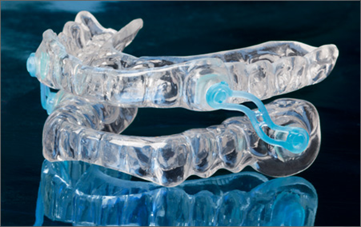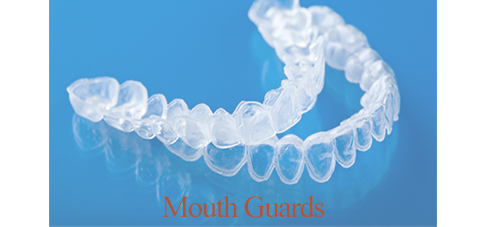Call: (760) 471-2231
Mouth Guards and Sleep Appliances
Sleep Apnea and Snoring
It is important to distinguish between snoring and Obstructive Sleep Apnea (OSA). Many people snore. While loud disruptive snoring is at best a social problem that may strain relationships, for many men, women and even children. Loud habitual snoring may signal a potentially life threatening disorder: OSA.
Snoring of this magnitude can cause several problem, including marital discord, sleep disturbances and waking episodes sometimes caused by one’s own snoring. But, snoring does not always equal OSA; sometimes it is only a social inconvenience. Still, even a social inconvenience can require treatment. Snore guards are an option.

Identifying and Treating OSA
Unlike simple snoring, Obstructive Sleep Apnea is a potentially life-threatening condition that requires medical attention. The risks of undiagnosed OSA include heart attack, stroke, irregular heartbeat, high blood pressure, heart disease and decreased libido. In addition, ODA causes daytime drowsiness that can result in accidents, lost productivity and interpersonal relationship problems. The symptoms may be mild, moderate or severe.
Sleep apnea is fairly common. One in five adults has at least mild sleep apnea and one in 15 adults has at least moderate sleep apnea. OSA also affects 1% to 3% of children. During sleep, the upper airway can be obstructed by excess tissue, large tonsils and/ or a large tongue. Also contributing to the problem may be the airway muscles, which relax and collapse during sleep, nasal passages and the position of the jaw.
The cessation of breathing, or “apnea,” brought about by these factors initiates’ impulses from the brain to awaken the person just enough to restart the breathing process. This cycle repeats itself many times during the night and may result in sleep deprivation and a number of health-related problems. Sleep apnea is generally defined as the presence of more than 30 apneas during a seven hour sleep. In severe cases, periods of not breathing may last for as long as 60 to 90 seconds and may recur up to 500 times a night.
SYMPTOMS OF SLEEP APNEA
Those who have OSA are often unaware of their condition and think they sleep well. The symptoms that usually cause these individuals to seek help are daytime drowsiness or complaints of snoring and breathing cessations observed by a bed partner. Other symptoms may include:
• Snoring with pauses in breathing
• Excessive daytime drowsiness
• Gasping or choking during sleep
• Restless sleep
• Problem with mental function
• Poor judgment/ can’t focus
• Memory loss
• Quick to anger
• High blood pressure
• Nighttime chest pain
• Depression
• Problem with excess weight
• Large neck (>17” around in men, >16” around in women)
• Airway crowding
• Morning headaches
• Reduced libido
• Frequent trips to the bathroom at night
Treating Sleep Apnea
If you have mild to moderate sleep apnea, or are unable to use C-PAP, recent studies have shown that an oral appliance can be an effective firs-line therapy. The oral appliance is a molded device that is placed in the mouth at night to hold the lower jaw and bring the tongue forward. By bringing the jaw forward, the appliance elevates the soft palate or retains the tongue to keep it from falling back in the airway and blocking breathing. Although not as effective as the continuous positive airway pressure (C-PAP) systems, oral appliance are indicated for use in patients with mild to moderate OSA who prefer oral appliances, who do not respond to C-PAP, are not appropriate candidates for C-PAP, or who fail treatment attempts with C-PAP or behavioral changes. Patients using an oral appliance should have regular follow up office visits with their Dentist to monitor compliance, to ensure the appliance is functioning correctly and to make sure their symptoms are not worsening.
Talk with your doctor
Sleep apnea is a serious condition and individuals with OSA may not be aware they have a problem. If someone close to you has spoken of your loud snoring and has notice that you often wake up abruptly, gasping for air, you should consult your Dentist.

A mouthguard, or orthotic, is frequently used to treat dental problems like TMD, snoring, sleep apnea — and to protect your teeth during sports. Every mouthguard is carefully crafted by a dental lab based on impressions we take of your mouth and teeth, then precisely configured to fit your teeth and line up your bite. Best of all, it does all this with minimal impact on your ability to eat and speak.
Like your mouth itself, mouthguards need routine maintenance. If you have any questions about your mouthguard, or are experiencing any discomfort from wearing it, please give us a call.
Types of Mouth Guard
1. Stock mouth guards are preformed and come ready to wear. They are inexpensive and can be bought at most sporting good stores and department stores. However, little can be done to adjust their fit, they are bulky, make breathing and talking difficult, and they provide little or no protection. Dentists do not recommend their use.
2. Boil and bite mouth guards also can be bought at many sporting goods stores and may offer a better fit than stock mouth protectors. The "boil and bite" mouth guard is made from thermoplastic material. It is placed in hot water to soften, then placed in the mouth and shaped around the teeth using finger and tongue pressure.
3. Custom-fitted mouth guards are individually designed and made in a dental office or a professional laboratory based on your dentist's instructions. First, your dentist will make an impression of your teeth and a mouth guard is then molded over the model using a special material. Due to the use of the special material and because of the extra time and work involved, this custom-made mouth guard is more expensive than the other types, but it provides the most comfort, protection and certainly the better choice.
Generally, mouth guards cover your upper teeth only, but in some instances (such as if you wear braces or another fixed dental appliance on your lower jaw), your dentist will make a mouth guard for the lower teeth as well. Your dentist can suggest the best mouth guard for you. An effective mouth guard should be comfortable, resist tears, be durable and easy to clean, and should not restrict your breathing or speech.
For more information on sleep apnea please visit the National Institute for Health by clicking here.

